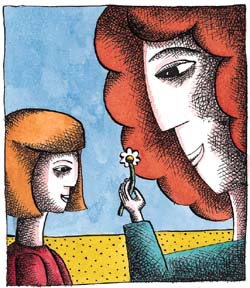
The Talmud says every blade of grass has an angel who bends over it whispering, "Grow, grow." A former Weizmann Institute student, not content with whispering, is passing along the word loud and clear from Israel to Germany. That word is Perach (flower in Hebrew), an ingenious tutoring program that originated at the Institute in 1974.
Thanks to the untiring efforts of Dr. Tilly Bakker, an equivalent program is about to sprout at the University of Osnabrueck. (It will be called "Pal Up!") Bakker reflects: "The idea is so simple and convincing that one wonders why it hasn't been implemented all around the world."
The Perach principle: To couple disadvantaged kids with college students in a win-win combination that earns kudos while widening life's possibilities for program participants and their families.
Amos Carmeli is Perach's national director. "Recognizing the great potential of the influence of college students on less advantaged kids, we built an intensive program to bring them together." This translates into twice-a-week, two-hour-plus sessions that may range from homework to going places to just plain talking. The college students receive a scholarship from public and private funds; these stipends constitute almost half their college tuition.
When Bakker (who grew up in Holland) participated in the project in 1974 it was just a bud, being nursed into full bloom with the help of Prof. Haim Harari, then Dean of the Weizmann Institute's Feinberg Graduate School. Bakker tutored two girls, the eldest children in a large Iraqi-Israeli family. "Their mother stayed at home to take care of all the children; their father had a job at the marketplace. He was an intelligent man who had emigrated to Israel as a young adult. Unfortunately, he never found his place in Israeli society. In addition, he had a metabolic illness. To the kids I was both an interesting 'big sister' they could show off to their friends and a 'helpless' person who needed their support to learn proper Hebrew. This may have contributed to their self-esteem. But I think my self-esteem increased as well. I was fascinated by this new cultural background and -- above all -- I basked in the warm feelings of unconditional friendship extended to me by the whole family."
One especially heartwarming instance was a farewell party the Iraqi family threw for Bakker and her husband before she departed for further studies in the U.S. "I vividly remember that Bidur, an elderly lady, inverted a cup with the remnants of my coffee grounds and then read the future to us: 'You will make a long journey and you will have two sons.' At the time we hadn't had our children yet, and they very much pitied us for that. We now have two daughters."
The Pal Up! project is in its preliminary stages, awaiting approval from a grants agency. "We hope to start recruiting college students and matching them with schoolchildren next fall. It will be good both for the ever increasing number of disadvantaged kids -- some from other cultures -- and for our students."
Today Bakker is a Doctor of Microbiology at Osnabrueck University. She began her graduate work at the Weizmann Institute in 1971, working with the late Prof. Mordhay Avron on spinach chloroplasts. She earned her Ph.D. at the University of Amsterdam and her postdoctorate at the Hebrew University's Faculty of Agriculture, adjacent to the Weizmann Institute. During this period, she joined Perach. Today she is researching enzymes from primitive eukaryotic organisms, with the aim of finding clues to the evolutionary development of regulatory systems that digest proteins.
